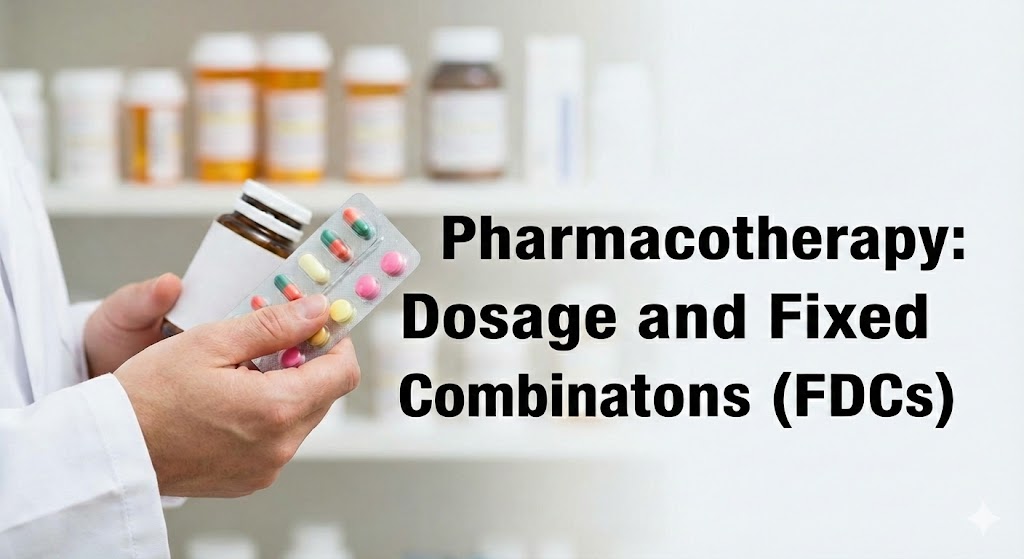Introduction
Are you looking to demystify the complex world of pharmacotherapy? Whether you’re a healthcare provider, a patient, or someone interested in medical science, understanding the nuances of drug dosage and Fixed Dose Combinations (FDCs) is crucial. In this comprehensive guide, we’ll delve into the ever-evolving science of pharmacotherapy, explore the intricacies of drug dosage, and shed light on the pros and cons of FDCs.
What is Pharmacotherapy?
Pharmacotherapy is a dynamic field that continually adapts to new research and patient needs. It’s not just about administering drugs; it’s about understanding the drug itself, the disease it aims to treat, the patient’s unique physiology, and the broader medical context.
The Importance of Drug Dosage
When it comes to effective pharmacotherapy, getting the drug dosage right is paramount. The term ‘dose’ refers to the specific amount of medication needed to achieve the desired effect in a patient. For example, aspirin can serve multiple purposes, and its dosage varies accordingly, from treating headaches to acting as an antiplatelet agent.
Strategies for Determining Drug Dosage:
- Standard Dose: Suitable for most patients, e.g., oral contraceptives.
- Adjusted Dose: Tailored based on measurable physiological functions, e.g., antihypertensives.
- Target Concentration Dose: Used for drugs like antidepressants where the effect is not easily measurable.
- Calibrated Dose: Employed when maximum efficacy may lead to intolerable side effects, e.g., anticancer drugs.
Navigating the World of Fixed Dose Combinations (FDCs)
Fixed Dose Combinations (FDCs) are pharmaceutical products that contain more than one active ingredient. While they offer the convenience of multiple drugs in a single pill, they come with their own set of challenges.
Advantages of FDCs:
- Convenience and Compliance: Simplifies complex medication schedules.
- Synergistic Effects: Enhances therapeutic effects, e.g., sulfamethoxazole and trimethoprim.
- Additive Therapeutic Effects: Offers combined benefits without additive side effects, e.g., amlodipine and atenolol.
Disadvantages of FDCs:
- Dose inflexibility Makes individual dose adjustments challenging.
- Adverse Effects: It is difficult to identify the component causing the side effects.
- Contraindications: One component can make the whole combination unsuitable for some patients.
Conclusion: The Balanced Approach to Pharmacotherapy
Pharmacotherapy is a multifaceted discipline that requires a balanced approach. Understanding drug dosage is crucial for effective treatment, and while FDCs offer convenience, they must be used judiciously. Whether you’re a healthcare provider or a patient, being well-informed is the first step toward achieving optimal therapeutic outcomes.
We hope this guide has provided you with valuable insights into the world of pharmacotherapy, drug dosage, and Fixed Dose Combinations. Stay tuned for more informative articles on healthcare and medicine!
Disclaimer: This article is for informational purposes only and should not be considered medical advice. Always consult with a healthcare provider for medical advice and treatment.
FAQs
- What is pharmacotherapy?
- It’s the science of treating diseases with drugs, considering various factors like the drug’s properties, the disease, and the patient’s physiology.
- How is drug dosage determined?
- Dosage is determined based on the drug’s potency, its pharmacokinetic properties, and individual patient needs.
- Are Fixed Dose Combinations (FDCs) always beneficial?
- While FDCs offer convenience, they also have limitations like dose inflexibility and potential for adverse effects.
Medical Disclaimer
The medical information on this post is for general educational purposes only and is provided by Pharmacology Mentor. While we strive to keep content current and accurate, Pharmacology Mentor makes no representations or warranties, express or implied, regarding the completeness, accuracy, reliability, suitability, or availability of the post, the website, or any information, products, services, or related graphics for any purpose. This content is not a substitute for professional medical advice, diagnosis, or treatment; always seek the advice of your physician or other qualified health provider with any questions you may have regarding a medical condition and never disregard or delay seeking professional advice because of something you have read here. Reliance on any information provided is solely at your own risk.

